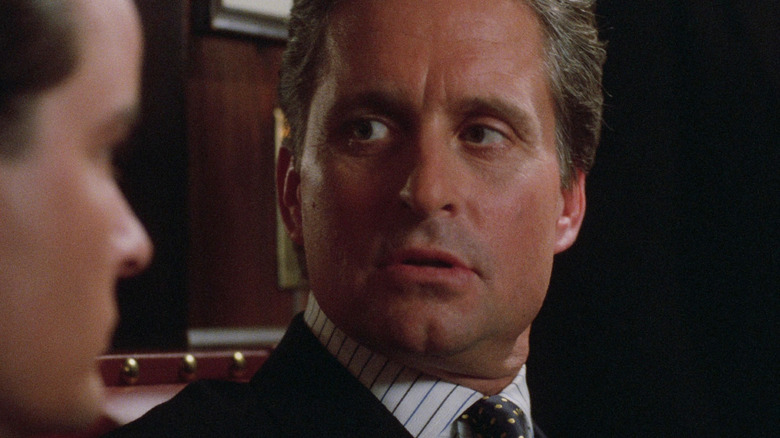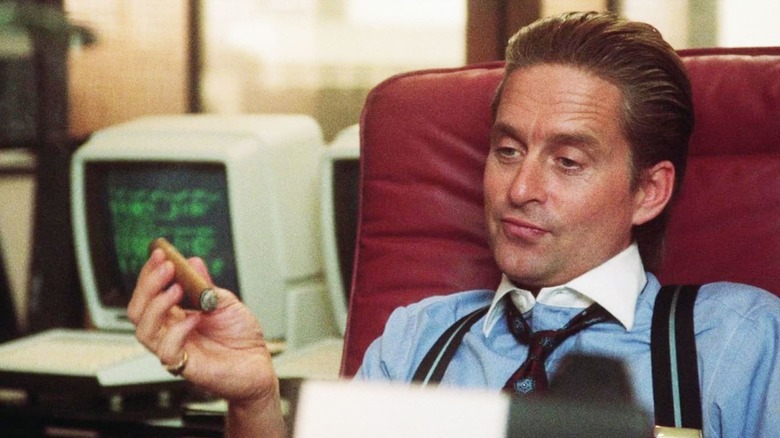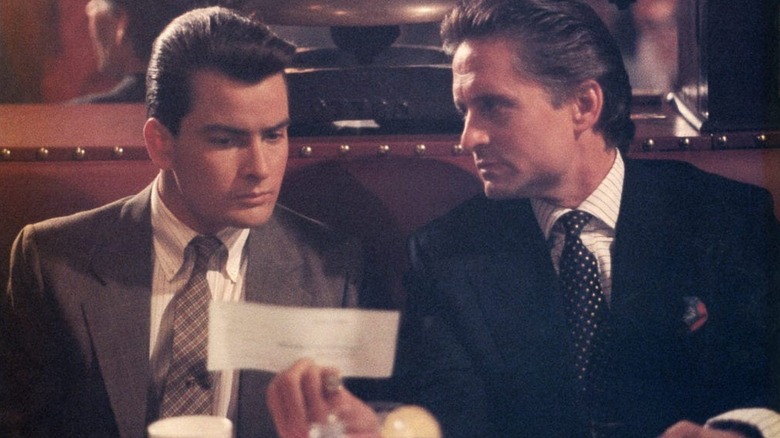Oliver Stone Brought A 'Vietnam Mentality' To Directing Michael Douglas During Wall Street
As far as American cinema was concerned, the 1980s were a heavily bifurcated time. On the one hand, there were numerous films about the glory days, the music, and the nostalgia of the 1950s reflected in films like "Diner," "Stand By Me," or "The Big Chill." At the same time, many films just as aggressively satirized the rising tide of conservatism in the U.S., using punk and paranoia to undo the decade's tendency to look backward. Films like "Parents," "Christine," and "A Christmas Story" painted the 1950s as a darker time, and films about the modern yuppie milieu depicted the decade's callow rich as Earth's newest supervillains (see: "Fatal Attraction," "Trading Places," "Down and Out in Beverly Hills," the TV series "Thirtysomething").
Oliver Stone's 1987 film "Wall Street" was the crown jewel of the anti-yuppie movie movement, depicting cutthroat stockbrokers as amoral jerks who would stab anyone in the back if it meant they could close a deal, manipulate stocks, and make a few more million dollars. At the film's conclusion the beleaguered and betrayed Bud Fox (Charlie Sheen) confronts his Wall Street mentor Gordon Gekko (Michael Douglas) after Gekko sold out Bud's father. He asks Gekko in outrage how much is enough? How much money will it take before Gekko can feel like he can stop clawing at more? "It's never enough," Gekko cries.
Not only is this a declaration of yuppie greed run amok, but it also proved to be dismayingly true. A study published in 2021 showed that earning more money, even if you're already rich, increases one's happiness. The rich are not like us — something Stone recognized while directing Douglas in what would become one of the most famous performances of his career.
'You look like you've never acted before in your life.'
In a 2017 interview with Vanity Fair, in celebration of the film's 30th anniversary, Michael Douglas looked back on "Wall Street" and the role that won him both a Golden Globe and an Academy Award. Douglas recalled with clarity the bizarre way that Oliver Stone — an intense human being — tried to get a better, angrier performance out of him. Gordon Gekko is the ultimate yuppie, and using his buttery voice, slicked-back hair, and dazzling confidence, convinces Bud Fox and the rest of the world that greed is good. Stone clearly wanted Gekko to give off a supervillain vibe, and Douglas wasn't quite providing what he wanted.
To get it, Stone practiced a bit of reverse psychology on Douglas, attempting to bring out the actor's natural rage by insulting his talents. Stone knew that Douglas didn't like to re-watch dailies on a set, preferring to feel his performances rather than look back and analyze. One day, as Douglas told it, Stone pulled him aside and had a serious talk. "He said, 'Michael are you doing drugs? Because you look like you've never acted before in your life,'" Douglas recalled. The actor immediately sensed that his director was saying more than mere insults, and violated his personal rule to look at some dailies. It "looked pretty good," he said, and he immediately knew what Stone was up to. He explained:
"Oliver wanted just a little bit more anger. He was willing to forgo our relationship to get that performance, and I went to town and worked my ass off after that conversation."
The Vietnam mentality
It should be noted that Oliver Stone had, just the year prior, completed work on his Best Picture Oscar-winning film "Platoon," a cynical tragedy about the Vietnam War. Stone established himself as a forthright, open-throated political artist, a view that was reinforced by the anti-capitalist themes of "Wall Street." For many years, Stone was a filmmaking mercenary, using the medium to confront and provoke. Michael Douglas understood that about Stone in 1987, and felt that it was the director's real-life war experience that colored his directing. He called it Stone's "Vietnam mentality ... He wants you in the trench with him."
Although savvy to Stone's tricks, Douglas did tap into his rage, and created a gloriously evil character that emerged as one of the scarier movie villains of the 1980s. Scary, because he was all too real. In a way, Gordon Gekko was almost too cool. Ben Younger's 2000 film "Boiler Room" was about then-modern wannabe hotshots who had seen "Wall Street" and would repeat Gekko's dialogue like it was holy writ. Gekko's philosophy was clear: Having wealth and power is preferable to being decent or helpful or developing any kind of personality or skill.
Stone reunited with Douglas in 2010 to make the sequel "Wall Street: Money Never Sleeps," but by then, the magic was gone. Stone had matured as a filmmaker — and as a person — and had less interest in being as confrontational or as caustic as he had been 23 years earlier. Although the United States was recovering from the global financial crisis of 2007-2008 at the time, Stone didn't stick it to 21st-century Wall Street the way he would have as a younger man. It's too bad; the message would have been appreciated.


